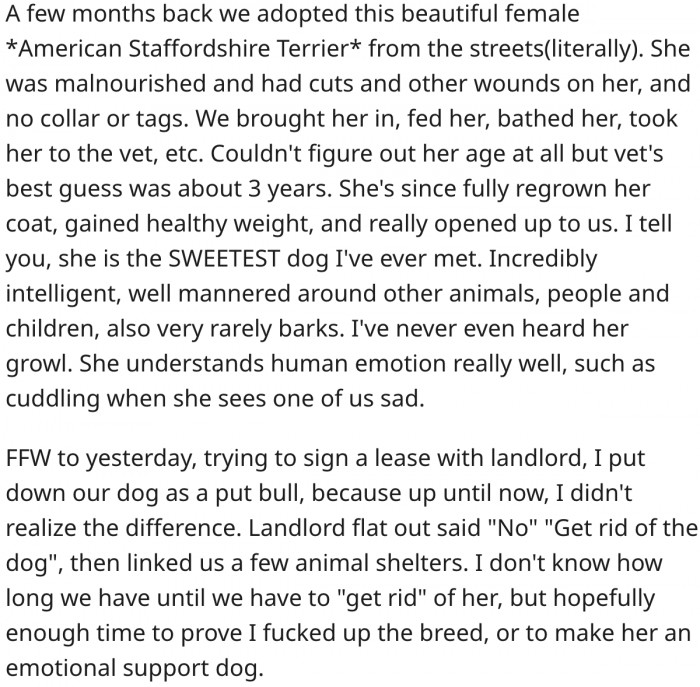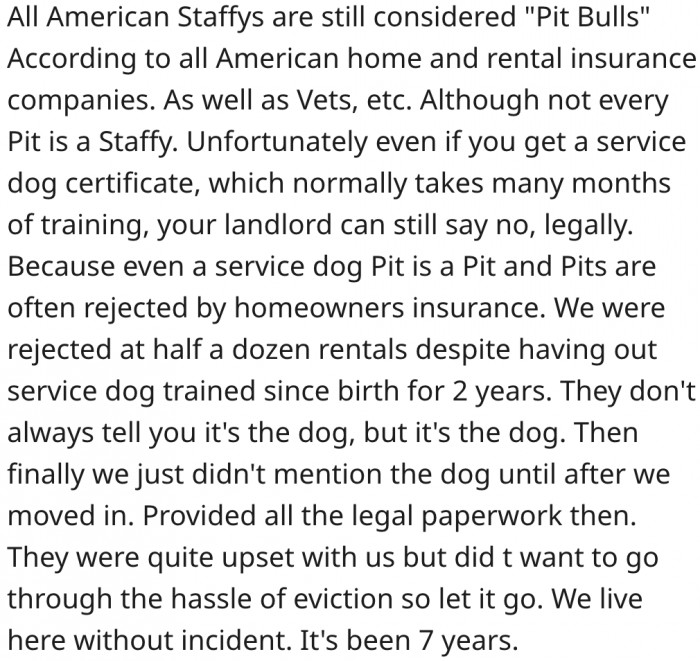Renter Accidentally Identifies Her Staffie As Pitbull On Lease Application Then Landlord Asks Her To Get Rid Of Her
A Reddit user who goes by the name RagingNerd312 shared a post on the "TIFU" subreddit about a mistake she made with her dog. In the post, RagingNerd312 disclosed that she had adopted a female American Staffordshire Terrier some months ago after rescuing it from the streets.
The dog was malnourished and had cuts and wounds when she found it. Since the dog had no collar or tags, she took it in and provided it with food and medical care.
RagingNerd312 said she was unable to determine the dog's age, but the vet estimated it to be about three years old. The dog has since fully recovered, regained its healthy weight, and has become very attached to its new family.
RagingNerd312 described the dog as incredibly intelligent, well-behaved around other animals, people, and children, and very quiet. Unfortunately, RagingNerd312 made a mistake while filling out a lease application with a landlord.
She mistakenly identified her dog as a pit bull instead of an American Staffordshire Terrier. The landlord rejected the application and told her to get rid of the dog.
RagingNerd312 is now trying to find ways to prove to the landlord that her dog is not a pit bull and is, instead, an American Staffordshire Terrier. She is considering registering her dog as an emotional support animal and is planning to visit her doctor, who had previously diagnosed her with depression, for assistance in this regard.
She is also planning to visit the vet to get her dog verified as an American Staffordshire Terrier and hopes the landlord will accept it. Below is how the TIFU community responded to her post.
Here's OP's story.

She's relying on her doctor, but here's what Reddit thinks.

1. Proving the dog is a Staffordshire is the same as proving it is a pitbull.

Misidentification of dog breeds can highlight deeper societal biases and misconceptions. Research illustrates how breed stigma, especially against breeds like pit bulls, often leads to negative perceptions and discrimination, both of which are rooted in fear and misinformation.
According to a study published in the Journal of Applied Animal Welfare Science, public perception of dog breeds can influence housing policies, making it crucial for landlords and renters to educate themselves on the facts surrounding breed behavior and temperament.
Understanding the emotional impact of pet loss or separation can provide important insights into tenant-landlord dynamics. Research indicates that the bond between pets and owners is akin to familial attachments, which can lead to grief when threatened.
According to a study published in the journal Anthrozoös, recognizing this bond can inform landlords about the potential emotional consequences of pet restrictions, encouraging more empathetic policies that consider tenants' emotional well-being.
Understanding Breed Bias in Animal Perception
The misidentification of dog breeds can have serious implications, as seen in this renter's experience.
Research in animal behavior shows that public perceptions of certain breeds can influence treatment and acceptance.
Studies indicate that breeds labeled as 'dangerous' often face discrimination, impacting owners’ rights and opportunities, such as housing access.
2. She would need to find another place to live.

3. Getting a service dog certificate may not resolve her problem.

4. She could just label the dog as a mixed breed.

Emotional Attachment to Pets
Psychological research emphasizes the profound emotional bonds formed between pets and their owners. A study by the University of Missouri found that pet owners often experience lower levels of anxiety and depression, indicating that these relationships provide significant emotional support.
As pets can serve as sources of unconditional love and companionship, understanding this dynamic may help renters advocate effectively for their pets during housing applications and disputes.
This situation raises important questions about stigma and bias in society.
Social psychologists have found that stereotypes can lead to discriminatory practices, even in situations where they are unfounded.
The stigma associated with specific dog breeds reflects broader societal biases, highlighting the need for greater awareness and education on animal behavior.
5. American Staffordshire Terrier is a breed of pit bull-type dog.

6. There's no difference between both breeds.

7. Registering the dog as an emotional support animal may not convince the landlord to change his stance.

When dealing with conflict over pet ownership, effective communication is key. A clinical psychologist highlights the importance of assertiveness in expressing needs while maintaining respect for others' concerns.
Research published by the American Psychological Association suggests that using 'I' statements can facilitate better understanding and reduce defensiveness during discussions, making it easier to address issues like pet ownership in rental agreements.
Educating Others on Breed Misconceptions
One effective strategy to combat breed bias is community education about dog behavior and temperament.
Research shows that informed communities can foster positive relationships between pet owners and non-pet owners, reducing fear and misinformation.
Organizing workshops or informational sessions can help demystify breed characteristics and promote understanding.
8. It is a common problem that owners of the breed face.

9. All dog breeds have the potential to bite if they are not trained properly.

10. It's sad that American staffies are not welcomed everywhere.

Coping with Rental Stresses
Experiencing housing challenges can lead to significant stress and anxiety. Studies show that practicing mindfulness techniques can help mitigate these emotional responses. Dr. Jon Kabat-Zinn's research on mindfulness-based stress reduction indicates that focusing on the present moment can significantly lower levels of distress.
Incorporating short mindfulness exercises throughout the day can help individuals manage anxiety related to housing issues, fostering resilience in challenging situations.
Advocacy for policy changes regarding breed discrimination can also be beneficial.
Engaging in community discussions and collaborating with local animal welfare organizations can bring attention to the consequences of breed bias.
Building alliances with like-minded individuals can create a stronger voice for change, leading to more inclusive policies.
What Do You Think?
American Staffordshire Terrier (Amstaff) and pit bull are often used interchangeably, but they are distinct breeds. The American Staffordshire Terrier is a medium-sized, short-coated dog breed that originated in England.
It is known for its loyalty, determination, and courage. Amstaffs are a muscular and athletic breed that has a strong, stocky build. They are also known for their friendly and outgoing personalities.
Pit bull, on the other hand, is a term used to describe a type of dog that is typically a mixture of several breeds, including the American Pit Bull Terrier, American Staffordshire Terrier, and Staffordshire Bull Terrier.
Pit bulls are known for their strength and athleticism. It's important to note that the behavior of a dog is not determined by its breed but by how it is raised and treated by its owner.
Pit bull-type dogs can make loving and loyal pets when they are properly trained and socialized. What do you think?
Psychological Analysis
This scenario underscores the impact of societal bias on individual lives, particularly regarding pets.
Understanding the psychological mechanisms behind breed bias can foster empathy and encourage proactive measures to combat discrimination.
Analysis generated by AI
Analysis & Alternative Approaches
Addressing breed bias is crucial in fostering a more inclusive society for all pet owners.
By promoting education and advocacy, we can challenge stereotypes and create more equitable opportunities for responsible pet ownership.
Ultimately, changing perceptions begins with awareness and understanding.
Solutions & Coping Strategies
Understanding the psychological dimensions of pet ownership and its implications in rental situations is crucial. Research indicates that fostering positive communication and empathy can lead to better outcomes for both landlords and tenants.
By addressing biases and advocating for pet-inclusive policies, stakeholders can create supportive environments that recognize the emotional significance of these bonds. Ultimately, a collaborative approach can benefit everyone involved, ensuring that both human and animal companions are considered in housing decisions.



